- Home
- Susan Howatch
Ultimate Prizes Page 13
Ultimate Prizes Read online
Page 13
My dear Miss Tallent:
It is hard to express on paper how deeply your letter affected me, so I hope that next time you have leave I shall be able to see you in order to express my gratitude in person. Meanwhile I can only thank you from the very depths of my being for your unstinting sympathy, your kind thoughts and your most welcome prayers.
Yours sincerely,
N.N.A.
I read this letter through twice. Then madness gripped me. Tearing the letter in two I grabbed a fresh sheet of paper and wrote:
Dear Dido,
Your letter was a lifeline. How soon can we meet? Can you return to Starbridge immediately without risk of being court-martialled for desertion? I need to see you urgently.
Yours,
STEPHEN.
But of course this reckless piece of lunacy had to be burnt at once in the ash-tray. Finally I wrote:
My dear Miss Tallent,
Your letter meant a great deal to me and I thank you for it with all my heart. Is there any chance that you might be able to return to Starbridge in the near future? I don’t want to tempt you into going AWOL, but I’d so very much like to see you. This letter comes with all the usual good wishes and blessings from your mentor
N.N.A. (“S”).
She was on my doorstep by noon of the following day.
3
“I paused only to twist the authorities around my little finger,” she said as I led her into the study and closed the door, “but I got the leave so you needn’t worry about me being AWOL. Gosh, you look completely ship-wrecked! What can I do to save you from drowning?”
Insanity finally triumphed. “Marry me,” I said, and took her in my arms.
“Stephen!” She recoiled. “My God, what are you saying?”
“But you can’t be surprised! You must have known!”
“Known what?”
“Known I’m in love with you!”
“But you can’t be! And even if you are, you can’t possibly say so, not now, not so soon after your wife’s death!”
“Well, I’m saying it. I love you—and since you said at Starmouth Court that you were passionate about me—”
“But I didn’t mean it! I mean, I didn’t mean it in that way! I mean—oh God, what did I mean, what the hell’s happening, this situation’s plunged right out of control—”
“But Dido—darling;—”
“Now look here, Archdeacon dear, this simply isn’t playing the game. I’m the one who has to be burning in a fever of unrequited love! You’re the one who has to be implacably austere and deliriously unobtainable!”
“I don’t like that game any more. I’m tearing up the rules,” I thought she was going to faint but she merely collapsed on the nearest chair. In a shaking voice she said: “I don’t play any other game.”
“Never mind, you’ll soon learn the new one. After all, you did say you wanted to marry a clergyman—”
“Yes, but for God’s sake, not a widower with five children—I’m not completely insane even if you are!” Making a great effort she jumped to her feet, looked me straight in the eyes and said bluntly: “It’s not on. I’m very sorry, I know it’s all my fault and I’ve behaved abominably, but you’ve got to understand that I shall never marry you, never, not even if I live to be a hundred.”
There was only one answer to that. It was not an answer any clergyman should have given, but the scene had stripped aside my clerical mask to expose the rough, tough, dogged Yorkshireman beneath. “You little bitch,” I said, “I’m going to marry you even if it’s the very last thing I ever do.” And as the violent excitement blazed through every particle of my being, I saw her as the prize which I could never have endured to lose.
4
It will be clear by this time that I was in a disturbed mental state, so I shall surprise no one when I now disclose that I was mad enough to marry her. It took me over two and a half years to lure her to the altar, but in the end I got what I wanted, and in the meantime what a splendid chase this prize offered me—so stimulating, so enthralling, so nerve-racking and so addictively exciting! I chased and I chased and I chased, many times rebuffed and cast down but never for one moment abandoning hope, and ahead of me danced my prize, weaving this way and that, now drawing closer, now haring for cover, but finally allowing me to flog her down the finishing strait towards matrimony as both her early demobilisation from the Wrens (arranged, of course, by her influential father) and her thirtieth birthday loomed on the horizon of 1945.
It would be too wearisome to recount our bizarre courtship in detail, so I shall recall only one incident which will illustrate both the staying-power of my obsession and the stranglehold of her fear of marriage. I had been chasing her for a year when she summoned me to London to meet her father. Naturally I assumed this invitation boded well for my future, but when I was confronted by Mr. Tallent, a bumptious City shark the size of a minnow, I soon realised my mistake.
“If you want to marry Dido for her money, you’re wasting your time,” he said, speaking with an accent in which genteel Edinburgh wrestled with the Glasgow slums. “She’s got no money of her own and the marriage settlement won’t give you a penny.”
“How very kind of you to inform me of your financial plans for her,” I said with a truly Christian self-restraint, “but I’m motivated by love, not money.”
“Then you’re a fool!” said this charmless individual, baring some yellow teeth and regarding me with contempt. “She doesn’t give a damn about you—you ask her about Harry Harland!”
As soon as I was alone with Dido I took his advice, and immediately she burst into tears. “I told Father to put you off,” she wept, “but I never meant him to go that far!”
“Well, he did go that far and nothing could put me off. What’s all this about Harland?” I demanded, imagining some flirtatious incident in a nightclub with this heavily decorated fighter pilot—indeed as it turned out Mr. Tallent himself had imagined no more than this—but to my horror Dido now confessed that the incident had resulted in the loss of her virginity.
I said: “You pathetic, muddled-up, wretched little girl. How can you endure to wallow in this revolting emotional mess when you could be loved and cherished as my wife?”
“But Stephen, I did it all for you!”
“You what? I’m sorry, either I’m hallucinating or you’re certifiable. Did you actually say—”
“I thought I couldn’t face marriage because I was frightened of sex, so I said to myself: Well, if I take the plunge at least I’ll know where I stand—and now I do know where I stand: in perpetual chastity. Oh Stephen, you’ve got to stop chasing me, you’ve absolutely got to, because I can never marry you now that I’ve discovered sex is so awful—and it was awful, honestly it was, I hated every minute—”
“Well, of course you did, you idiotic little fool! If you lie on your back with your legs apart and let some stranger romp all over you until he violates not just the most private part of your body but the most private recesses of your inner self, how can you expect to be other than revolted? But what’s all that half-baked disgusting behaviour got to do with us? What’s that got to do with marriage? What’s that got to do with going to bed with a man who loves you and who would treat you with reverence, with tenderness, with—”
“Don’t, don’t, don’t!” shrieked Dido, almost hysterical with remorse. “You’re making me feel I want to curl up and die!”
“That won’t be necessary. All you have to do to wipe out this incident is walk down the aisle with me.”
“Oh Stephen, you’re so wonderful, so perfect, so patient, so noble that I think I really will marry you after all—”
“When?”
“Oh, very soon—but not just yet …”
And so it went on.
Meanwhile it was hardly surprising that the people who cared most about my welfare were nerving themselves to persuade me that marriage with Dido would be a disaster.
“You can’t seriously w
ant to marry this woman,” said my brother Willy. “Archdeacons and society girls just aren’t designed by God to mix without bursts of lewd laughter erupting on all sides—think of all the ‘said-the-bishop-to-the-actress’ jokes! I simply don’t understand this grand passion of yours. How could you even consider marrying a woman who’s the exact opposite of your perfect Grace?”
“It’s because Grace was so perfect that I’ve got to marry someone utterly different. How could I tolerate a second-rate Grace who could do nothing but remind me of how much I’d lost?” I said logically enough, and when Willy remained dissatisfied I concluded that a confirmed bachelor would never understand the glorious compulsion which had enslaved me.
My next critic, however, was very far from being a confirmed bachelor. Alex Jardine, taking me to dine in London at the Athenaeum, said bluntly: “You can’t possibly marry that woman, Neville. It’s out of the question. She’ll ruin you.”
We were drinking sherry before taking our places in the dining-room; after Alex had delivered his opinion, my first instinct was to drain my glass and smash it. I did overcome this impulse to behave like a Cossack, but it cost me a considerable effort to say in a mild voice: “Aren’t you rushing to judgement, Alex? You hardly know Dido at all.”
“I know enough to realise you’re taking the most appalling gamble with your future. Obviously there’s a strong sexual attraction going on which is annihilating your common sense, and I can only pray to God that you haven’t already slipped up in the worst possible way.”
I was appalled. In fact I was so shocked that for a moment I could only wonder if I had heard him correctly. Then I realised that not only had I heard him correctly but that I had been insulted in a manner which, since we were both clergymen, was quite beyond toleration.
I heard myself say: “You can’t seriously believe I’d behave in any manner which represented gross misconduct.”
“Such things do happen.”
“Yes—to the clerical failures, but not to people like me! How can you sit there and even think that I’d—”
“I’m sorry.” Belatedly Alex realised he had gone too far. “I’m afraid that as a bishop I encountered the clerical failures, and even now I’m retired I tend to believe the worst on the grounds that the worst is usually true.”
Again I was appalled. “What a very cynical and unattractive attitude! And how profoundly un-Christian!”
“Listen, let’s just forget I ever said—”
“Oh no, I’m not letting you off the hook as easily as that! Now look here, Alex. I’m getting very tired of your habit of jumping to conclusions on the minimum of evidence, and when those conclusions also happen to be insulting, I think it’s time someone pointed out a few home truths to you. Don’t you realise that this rushing to judgement is actually rotten counselling? What happened to that bishop who used to pride himself on his pastoral care?”
Alex went white. At first I thought he was furious. Then I realised he was shattered. “I’m sorry,” he said numbly. “I suppose I’m too involved in your life. I’ve long thought of you as a son.”
“Well, I’m not your son and I won’t tolerate you passing judgement on me like some autocratic Victorian father. You’ve absolutely no right to interfere in my affairs like that!”
Now I was the one who belatedly realised he had gone too far. “No right?” repeated Alex as the colour flooded back to his face. “Did you say I had no right? I may not be your father, but who made you Archdeacon? Who made you what you are? What other bishop on the bench would have offered such a preferment to a draper’s son from Yorkshire?”
“I don’t deny you’ve been very good to me, Alex. All I’m saying is—”
“I suppose now that I’m just a retired bishop, someone who can no longer further your career, you feel I can be rebuffed and discarded! Well, all I can say is that you’d better take care you don’t wind up among life’s losers—a young clergyman who ignores his mentor’s advice usually comes to a sticky end!”
“And who are you to talk of losers?” I demanded, finally throwing all restraint to the winds. We were tucked away in a secluded corner of the room, but I was aware of the distant heads turning as I sprang to my feet. “During the five years you spent at Starbridge you succeeded in upsetting every other bishop in the House of Lords—why, you even insulted the Archbishop of Canterbury!—and when your ill-health forced you to retire, the Church of England’s collective sigh of relief equalled the velocity of a hurricane-force gale!”
Alex jumped up so violently that he overturned his glass of sherry. “No man talks to me like that!”
“Then it’s about time someone tried! And while we’re on the subject of you winding up a loser, why the deuce have you frittered away your retirement scribbling an autobiography—which never gets finished—in between visits to London to drink too much at the Athenaeum? I know you’ve got a heart complaint, but surely there was no need for you to be quite so idle! Why haven’t you preached the occasional guest-sermon—or offered to help out in a neighbouring parish where the vicar’s absent in the Army? Even our bête noire Jon Darrow had the grace to do that!”
“Obviously we’ve come to the parting of the ways,” said Alex in his bitterest voice. “I’d wish you well, but I fear I’d be wasting my time. It’s quite clear you’re hell-bent on ruining yourself.” And he walked out of the room.
Within minutes I was regretting my violent verbal assault, but although I later wrote more than once in an attempt to repair our friendship, he stubbornly refused to reply.
5
“My dear Archdeacon,” said Lady Starmouth just before the engagement was announced, “I wonder if I might take advantage of my numerous years of seniority and talk frankly about a matter which you may well prefer not to discuss. I refer, of course, to your attachment to Dido.”
By this time Lady Starmouth had been my devoted benefactress for over two years. She had found me a paragon of a housekeeper and a saint of a nursemaid, both possessing not only experience of clerical households but a remarkable tolerance of my inability to afford lavish salaries. She had invited me regularly to Starmouth Court; she always called at the vicarage whenever she was in the Starbridge area, and she had persistently introduced me to a succession of eligible church-going women who were all quick to proclaim their devotion to children. This benevolence was by no means unprecedented, since Lady Starmouth was renowned for her kindness to clerical protégés, but the fact that I was not the only pebble on the Countess’s privileged beach hardly altered the fact that I was under an obligation to listen to her, even when she declared herself on the brink of proffering unwelcome advice.
“I know what you’re thinking,” she said pleasantly. “You’re afraid I’m going to echo Alex Jardine’s opinion that marrying Dido would be disastrous for your career, but in fact I don’t agree with Dr. Jardine. Dido may be … shall we say eccentric? But she’s no fool and she does have this ambition to be a successful clerical wife. Why shouldn’t she realise this ambition if she marries an able man who’s devoted to her? No, I concede her effect on you may be beneficial. But I’m less optimistic about her effect on your children.”
“Dido shares your doubts, Lady Starmouth. For some time now she’s been using the children as an excuse to avoid the altar, but I’m personally convinced that the duties of a stepmother in this case wouldn’t be too arduous. After all, the older boys are away at school for two-thirds of the year, and since Sandy and Primrose have their nanny—”
“All children require an appropriate amount of care and dedication from their father’s wife,” said Lady Starmouth, “and I very much doubt whether Dido has the ability to meet such a challenge. Her background militates against her—think of that pathetic mother in Edinburgh and that frightful father in London! In Dido’s world if you’ve neither the time nor the desire to care for children properly you palm them off on someone else and hope to be relieved eventually of your responsibilities by a series of useful marriag
es.”
“But Dido’s by no means indifferent to children—in fact she’s very keen to have children of her own—”
“Of course—she’ll see them as little mirrors reflecting her own success. But Grace’s children? They’ll simply be mirrors reflecting the rival she’ll never quite manage to forget.”
I said at once: “Dido doesn’t seem to see Grace as a rival.”
“If she’s convinced you of that she’s been very clever—or maybe she hasn’t yet faced up to the reality which will be waiting for her if she marries you. I was a second wife, Mr. Aysgarth. I know all too well how easily first wives can be idealised, not only by their husbands but by their numerous friends as well, and it can be very hard to live in the shadow of a paragon. Dido may well profess to admire Grace, but I suspect that deep down her attitude borders on jealousy, resentment and dislike.”
The silence which followed this statement lasted until Lady Starmouth added abruptly: “You could do better for yourself, Archdeacon—and better for your children too. Think on what I’ve said and ask yourself if you don’t have a duty to look elsewhere.”
Naturally I promised her I would reconsider my position. Then I plunged straight back into the pursuit of my prize.
6
It might be thought that my work would have suffered from my obsession, but in retrospect I can see that between the summer of 1942, when Grace died, and the spring of 1945, when I remarried, I reached my zenith as an archdeacon. Possibly the sublimation of an inflamed sexual desire produced the unprecedented energy which I channelled into my work at this time; as a Modernist I can never ignore the theories of psychology, but personally I look askance at psychologists who produce a sexual explanation even for an innocent act such as tieing one’s shoelaces. The truth was that I was violently in love, even when Dido was at her most intolerable, and this peculiar form of insanity made life so relentlessly thrilling that I approached my work with a zest generated not (with all due respect to the Freudians) by physical frustration but by mental euphoria.

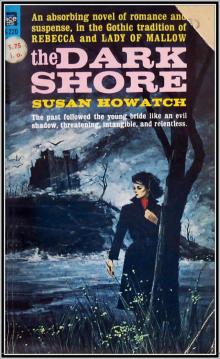 The Dark Shore
The Dark Shore Sins of the Fathers
Sins of the Fathers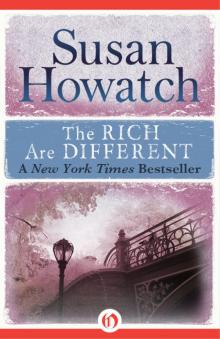 The Rich Are Different
The Rich Are Different The Shrouded Walls
The Shrouded Walls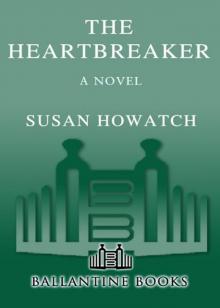 The Heartbreaker
The Heartbreaker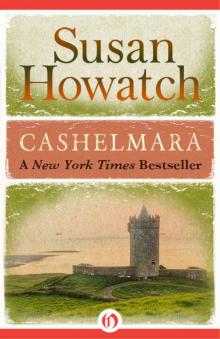 Cashelmara
Cashelmara The Wonder Worker
The Wonder Worker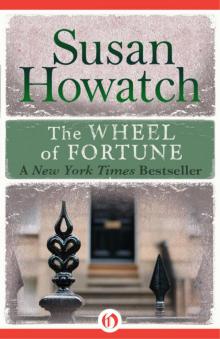 The Wheel of Fortune
The Wheel of Fortune Ultimate Prizes
Ultimate Prizes Penmarric
Penmarric The High Flyer
The High Flyer